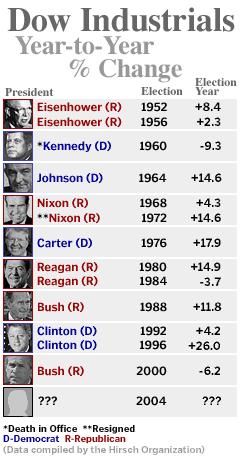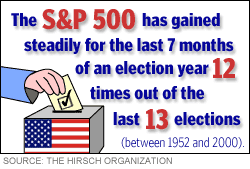NEW YORK (CNN/Money) -
People who think the market tends to follow the cycle of the presidency expect good things for 2004.
Not only are the economy and corporate profits expected to keep improving, but interest rates are low and are expected to stay that way for some time and the impact of large tax cuts will keep being felt. Plus, Saddam Hussein's in jail.

If history is an example, election years tend to be good for stocks as the party in power does what it can to stay there, including keeping investors happy. But there are exceptions: most recently, in 2000, when the country sat through a presidential nail biter. That year, the Dow lost more than 6 percent.
This time things are different though and analysts say regardless of which party wins, 2004 is promising to be in line with the rule, rather than another exception.
"The focus on the election is going to shift from overseas to domestic issues, and that means the economy," said J. Taylor Brown, vice president of the Hirsch Organization, the publishers of Stock Trader's Almanac. "Particularly when you have an incumbent, you're going to see that administration is paying a great deal of attention to the economy, because the party that is perceived as being most likely to propel economic growth is the party that's going to get elected."
Election year goodies
According to the Stock Trader's Almanac and other measures of presidential election cycle theory, the market trend coincides more often than not with the cycle of the presidency.
The theory says that the first and second year after an election are more uneven for the market as the new administration in power makes tougher decisions on the economy, taxes and other policies. Then the pre-election and election year are usually strong ones for stocks as the administration does everything it can to stimulate the economy enough to keep its party in power for four more years. This tends to be true whether it's an incumbent running for reelection or someone new.
Usually, the pre-election year is the best of the four. The Dow rose in 20 pre-election years of the last 24 election cycles, since Theodore Roosevelt took office in 1905, according to the Almanac.
In the last 24 election cycles, in the year of the election, the Dow gained 16 times.

So far, the current presidency seems to fit the trend of two down years for the market, one very strong year and one less strong, but still positive year. In George W. Bush's first two years in office, the Dow lost 7.1 percent and 16.8 percent, respectively, and in the current pre-election year, the Dow is up 23 percent as of late December. Historic trends suggest next year should be good, too.
"Theoretically, the incumbent wants the economic recovery to coincide with the election, but really it's a coincidence that those years tend to be positive," said Ned Riley, chief investment strategist at State Street Global Advisors. "I think it's more that there's a good feeling overall during that year -- everyone is promised the world and no one says anything bad to upset the markets."
Adding to the "coincidental" factor, the first two years of Bush's presidency coincided with the events of September 11, the recession, massive layoffs and the aftermath of the bursting of the stock market bubble of the late 1990s. Considering all these external factors, chances are the stock market would have reacted just as it did regardless of the presidential cycle.
So does it matter?
After surviving a three-year bear market, the major indexes have recovered handily this year, in a rally that started in March as the United States waged its war in Iraq. Year-to-date, as of Thursday's close, the Dow is up nearly 23 percent, the S&P 500 is up nearly 24 percent and the Nasdaq composite is up 46.5 percent. The Dow recently blew through 10,000 for the first time in more than 18 months.
Many analysts say next year is unlikely to be quite as strong for stocks, but they do believe the trend remains to the upside.
The latest economic reports seem to point toward a continued recovery -- U.S. gross domestic product growth surged to a 7.2 percent annual rate in the third quarter and even the labor market is starting to show signs of perking up. Earnings in the third quarter have been robust and are forecast to improve in the fourth quarter and 2004. Interest rates are at more than 40-year lows and are expected to stay that way. Although Democratic candidates have talked about repealing some portion of the Bush Administration's tax cuts should they win, that can't happen until 2005 at the earliest.
So while many analysts say next year's rally won't be as robust as that of 2003, with the same factors in place that spurred this year's bull market, 2004 has the potential to be reasonably upbeat, election year or not.

|

